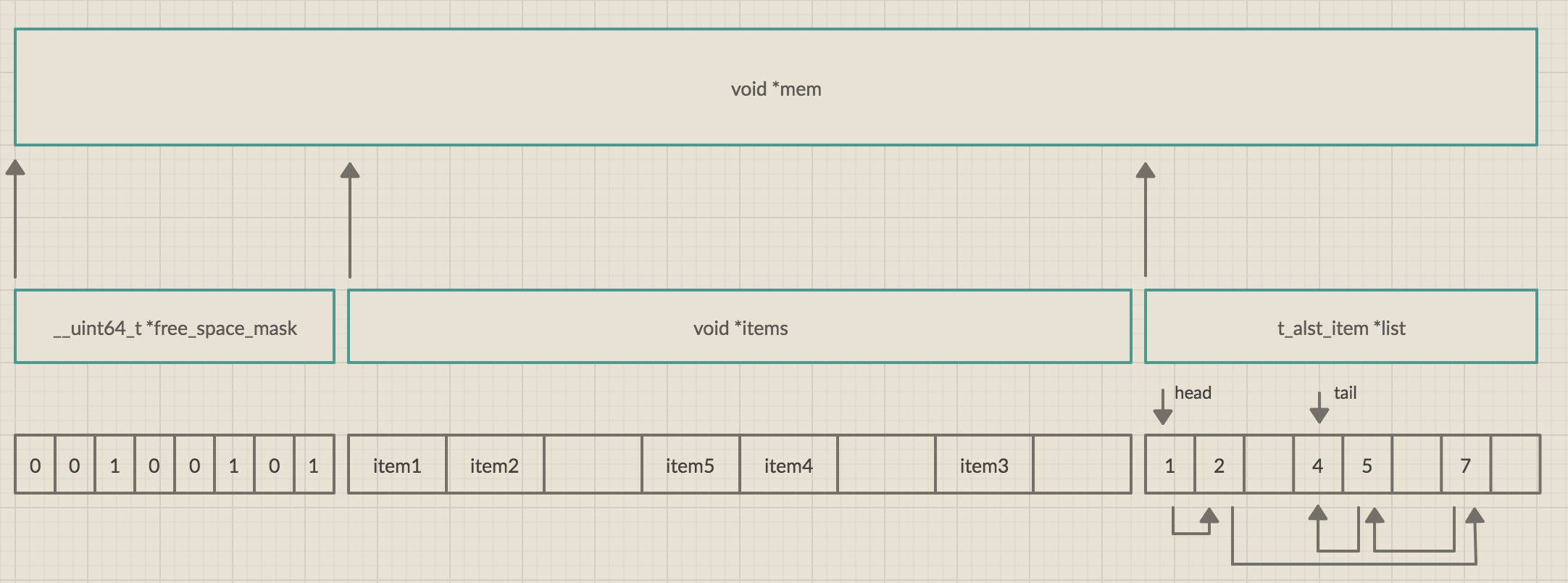-
Notifications
You must be signed in to change notification settings - Fork 0
List on array
Ilya Kashnitskiy edited this page Mar 2, 2020
·
12 revisions
This is the header with API: ft_list_on_arr.h and this is the implementation folder: sources/ft_list_on_arr/
If you are confused and do not understand why I bother with implementing a list on an array, read this or this or this or google something like
array vs list,access memory time/test,cpu & cache & paging & tactor etc.
typedef struct s_alst_item
{
size_t self;
size_t next;
} t_alst_item;
typedef struct s_list_on_arr
{
void *restrict mem;
__uint64_t *restrict free_space_mask;
void *restrict items;
t_alst_item *restrict list;
size_t head;
size_t tail;
size_t curlen;
size_t item_size;
size_t max_size;
} t_alst;

This is a dynamic structure! If the reserved memory is over, reallocation will be made with a 2-fold increase in size!
This is a special value (aka NULL for classic list) to indicate empty value.
If curlen = 0 head == tail == ALST_SPEC_VALUE
Also tail.next always equal ALST_SPEC_VALUE.
| Definition | Description |
|---|---|
void alst_init(t_alst *self, size_t item_size, size_t init_len) |
Initializes the alst self. init_len - initial size of alst (number of elements), must be > 0. |
void alst_del(t_alst *self) |
Free memory and fill self by zero. |
void alst_extend(t_alst *self) |
Doubles the self
|
size_t alst_get_space(t_alst *self) |
Finds a place for a new item and reserve it. |
void *alst(t_alst *self, size_t item) |
Returns pointer to the i-th element of a alst (not by order but by mem). |
void *alst_head(t_alst *self) |
Returns pointer to the first (head) element of a alst |
void *alst_tail(t_alst *self) |
Returns pointer to the last (tail) element of a alst |
t_alst_item *alst_add_head(t_alst *self, void *data) |
Adds an element from data to the head of the alst. Extends alst if necessary. |
t_alst_item *alst_add_tail(t_alst *self, void *data) |
Adds an element from data to the tail of the alst. Extends alst if necessary. |
t_alst_item *alst_add_after(t_alst *self, size_t item, void *data) |
Adds an element from data to the the alst after particular item. Extends alst if necessary. |
void *alst_pop_head(t_alst *self) |
Removes and returns pointer to the item at the head of the alst. Save the data from this pointer, otherwise it will be lost. |
void *alst_pop_after(t_alst *self, size_t item) |
Removes and returns pointer to the item after particular item of the alst. Save the data from this pointer, otherwise it will be lost. |
void alst_map(t_alst *self, void (*func)(void *)) |
Iterates over the entire alst from the beginning, applying the func function to each element. |
#include <libft.h>
void print(void *data)
{
ft_printf("%d ", *(int *)data);
}
void test(void)
{
t_alst lst[1];
alst_init(lst, sizeof(int), 2);
alst_add_head(lst, ft_i(10));
alst_add_tail(lst, ft_i(20));
alst_add_tail(lst, ft_i(30));
alst_add_head(lst, ft_i(40));
alst_add_after(lst, lst->head ,ft_i(50));
alst_map(lst, print);
alst_del(lst);
return ;
}
int main(void)
{
ft_memman_init();
test();
ft_printf("\n");
ft_force_buff();
ft_memman_clean();
return (0);
}
Output:
> a.out
40 50 10 20 30
Implementation of the alst_map() function (traversal of the list):
void alst_map(t_alst *restrict self, void (*func)(void *))
{
size_t cur;
t_alst_item tmp;
cur = self->head;
while (cur != ALST_SPEC_VALUE)
{
tmp = self->list[cur];
func(alst(self, tmp.self));
cur = tmp.next;
}
}